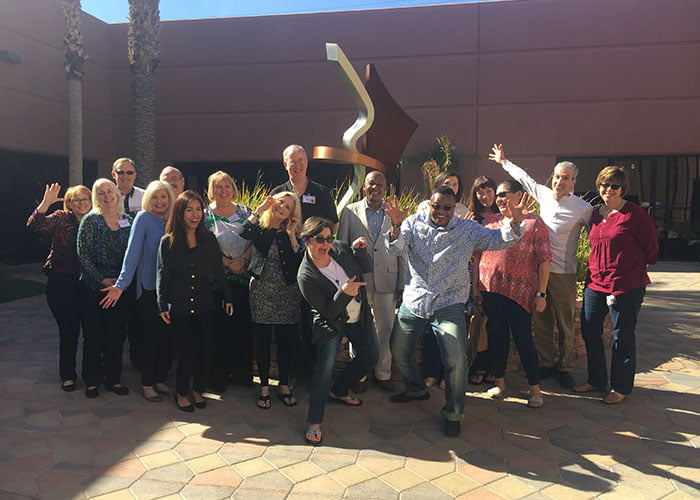I first heard about Appreciative Inquiry years ago, on a Google rabbit trail. You know what I’m talking about.
I’m talking about the rabbit trail that sometimes leads us to discover information about botched celebrity plastic surgeries, or some random tidbit of ‘knowledge’ about the lifecycle of a weevil or bed bug.
Well, the Google rabbit trail I wandered down all those years ago was a gooder. It didn’t lead me to a bunch of useless, negligibly interesting information that tends to clog up my already trivia-filled brain. It led me to learn about a concept that has had huge positive, life-changing, paradigm-shifting implications in my life. It led me to taking a recent trip to Las Vegas, more on that in a bit.
First off, I think that some people might find the term “Appreciative Inquiry” a bit dry and technical. If that’s where your brain went, I assure you, it’s not a dry or technical concept.
I like to equate the word “appreciate” to value, prize or revere. Those words feel rich to me. “Inquiry” is about discovering, envisioning and dreaming with innovation about what can be—right now.
The truth is the western culture focuses so much on deficits. What’s wrong? How can we fix this problem? What’s stopping this from being the best it can be? Why aren’t I/you living to my/your full potential?
I could go on and on here, but I’m sure you’ve heard similar queries. Basically I’m saying that the whole idea of problem-solving is flawed. This mindset, or paradigm, is based on seeing the glass half empty. The truth is that when we approach things from a problem-solving paradigm, we keep ourselves tied to the problem.
Freedom is big for me. There is no freedom when we are tied to a problem.
I find it really interesting that I can receive such positive encouragement and feedback from people, but if I hear one or two negative things, my mind ruminates on it for hours, or days—sometimes longer, especially if I feel that the comment is based on conjecture. If I’m not intentional about letting it go, I can let myself become plagued by the negative thoughts, for a really long time. I can feel the negativity in my body, the hairs on the back of my neck get prickly, or I get a knot or pain in my gut. I know I’m not alone here, I imagine a lot of you can relate.
The fact is that there is science behind this phenomenon. The reason why it’s very difficult to let that kind of negativity go, has to do with the brain’s limbic system—the primitive brain. But more on that in a future blog post.
So basically Appreciative Inquiry (AI) flips this whole negative paradigm on its head. It’s brilliantly simple, yet it can be quite complex to learn to see things differently and to integrate strength-based thinking into our “glass half full” brains. We all have a way of seeing the world the through the lens of our thoughts, experiences and feelings, shaping our reality in the process. If we see things through a positive lens, we will be creating happiness and wholeness for ourselves.
AI is about exploring, discovering and building on strengths. It’s about seeing the positivity, the beauty, and the profound in our lives, workplaces and communities.
Let’s first notice these things, explore them, and build on them, so that we can create a new paradigm for living happy, satisfying lives in the present.
In the philosophy of Appreciative Inquiry there is a strong focus on the present. So it’s different than goal planning or writing a mission or vision statement. The philosophy draws on strengths so that we can live fully now, not six months, or a year from today—right NOW.
We, as individuals, organizations, and businesses can focus so much on goals and reaching goals-outcomes measurement. But what happens when we achieve those goals? We simply check the goal off the list and then make new ones. As Shawn Achor says, “if happiness is on the opposite side of success, then we will never get there.”
The truth is if we are always living for the future we are never fully, mindfully living in the present.
Oliver Wendell Holmes said, “For the simplicity that lies this side of complexity, I would not give a fig, but for the simplicity that lies on the other side of complexity, I would give my life.”
My interpretation of this, in relation to positivity, is that “Simplicity that lies on the other side of complexity” happens when we focus on strengths, and build on them. It’s very simple, yet we as human beings really like to over complicate things by unconsciously adding layers of barriers that prevent us from seeing from a strength perspective.
So back to my Google rabbit trail…
I discovered Appreciative Inquiry years ago. I wasn’t brand new to the idea of building on strengths, because my work in mental health was really grounded in the recovery movement, which is also very strength-based. However, the idea of taking these ideas to the workplace and our communities was revelatory for me. I was a manager at that point, so I tried integrating some of the ideas into my work, but I always knew I wanted more.
 I discovered an AI Facilitator Training held by The Center for Appreciative Inquiry, in Las Vegas. When I wrote my business plan back in December, I already knew that I wanted Appreciative Inquiry to have a large role in my business, both in the overall philosophy and in the service Luminate Wellness Website provides.
I discovered an AI Facilitator Training held by The Center for Appreciative Inquiry, in Las Vegas. When I wrote my business plan back in December, I already knew that I wanted Appreciative Inquiry to have a large role in my business, both in the overall philosophy and in the service Luminate Wellness Website provides.
I hummed and hawed about when to take the training. Before I started this business venture, I really had no idea how complex and expensive starting a business was. Still, I knew taking this training was a priority for me. It took me almost two years to make the really spontaneous decision to sign up, and book a ticket to Las Vegas.
I hopped on a plane last week, and it was an amazing experience. (It was my first time in “sin city”, and really, I could write a whole blog post just on the oddity and grandiosity of that place. It was interesting to say the least.)
The facilitator training was a fantastic experience, with amazing people—people who became my friends by the end of the short, intense, and really fun week. On Monday morning we were a group of strangers with all different backgrounds, and by the end of the training on Thursday afternoon we were engaged, connected and expressing gratitude for each other. Strength-based thinking is profound, really. It can change life trajectories. Actually, it’s more like WE change our own trajectories when we choose to look at the world through a lens of possibility.
I’m very excited about where this journey is going to take me, and really about the process, because I want to be engaged and enjoy every twist and turn.
Last week was such a gift! It was certainly an investment—a investment worth every penny.
I wanted to share this TedTalk video we watched at the training. It’s by Shawn Achor and it’s called “The Happy Secret to Better Work.” It’s not a long video, but it’s profound.
At the end of the video (spoiler alert) he shares some research on how people have trained their brains to be more positive by doing the following practices on a regular basis:
- Practice daily gratitude. Express thankfulness for 3 things a day.
- Journal one positive thing a day.
- Exercise
- Meditation – allowing our brains to focus without multitasking.
- Practice random/conscious acts of kindness.
I’m making an effort to do these practices with my family regularly. Last night we were thankful for face painting done by a neighbour kid (which my daughter paid $2.00 for), good food, and an engaging meeting.
I’ll keep you posted on how it goes. Enjoy the video!
[youtube_sc url=”https://www.youtube.com/watch?v=fLJsdqxnZb0″ title=”Shawn%20Achor:%20The%20happy%20secret%20to%20better%20work” modestbranding=”1″ fs=”1″]


Add your comment now using your favorite social account or Click Here To Login
